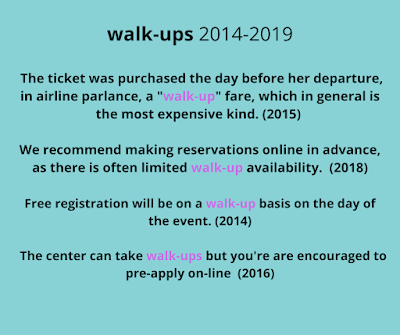Post-lockdown Coronavocab: pre-booking & walk-ups
This sign outside a local museum recently caught my eye because it contains interesting examples of two word types I’ve been working with lately; prefixes (pre-booked) and phrasal verbs/derived nouns (walk-ups). They also seem to reflect something of the new normal, in the UK at least, at the moment.
Pre-booked
This is one for the pedants out there! Because, of course, if you book something, you reserve it or buy your ticket in advance. So, what then is pre-booking? The pre- seems like a somewhat unnecessary prefix. And the difference between booking and pre-booking does seem to be a subtle one. Pre-booking simply emphasizes how far in advance you book. It can describe a situation where you can reserve something before it’s officially available to buy. It can just signify the need to book something well ahead rather than leaving it to the last minute and potentially losing out. And in this case, it emphasizes the idea that people need to book their tickets, probably online, ahead of arriving at the venue to avoid crowds of people queuing up.
Until quite recently, in the UK, almost anywhere you visited - a museum, exhibition, garden, restaurant and even most train tickets – had to be booked in advance and typically for a specific time slot in order to help venues to control the number of customers and avoid crowds of people. According to Merriam-Webster, prebook was first used back in 1855, but there does seem to be evidence that it’s seen a spike in usage in the past year (not sure what the spike in 2014 was down to).
Walk-ups
As regulations relax here, however, more places are starting to accept walk-ups; customers who arrive on the day without a booking.
Interestingly, this sense of walk-up doesn’t seem to feature in most dictionaries. Most list the US sense to refer to a multi-floor building without a lift/elevator where you literally have to walk up the stairs. M-W also has a sense “designed to allow pedestrians to be served without entering a building” as in a walk-up coffee counter, also a common feature of pandemic life where anything designed to keep people outdoors has flourished.

The walk-up counter at a local coffee shop
Corpus data shows that the ‘customer arriving on spec’ sense has been around for a while, although the inverted commas around the first example perhaps hint at the term’s origins as trade jargon rather than common everyday usage:
There has very clearly though been a significant jump in usage, which I suspect is less about this being a new term than the fact that, in a time of changing rules and norms, we have more need to differentiate between customers who pre-book and those who arrive on spec, and more clarity over what’s possible. [Note the stats here are for all senses of walk-up.]
Interestingly, the 2020-21 data shows lots of walk-up Covid testing sites, but also starts to hint at the opening-up of other venues to casual custom.
Walk-ins
And just when I thought this post was ready to go, I headed out for a walk to take photos of a couple of local walk-up coffee counters and … 1 I found one of my favourite coffee shops has moved its counter indoors – another sign of changing times, but still great coffee – 2 I came across several signs for walk-ins … So, I scurried back to my corpus to check it out.

A sign outside a local bar

And in the window of a barbers
Again, this is polysemous with its most common use as an adjective to describe large storage spaces – walk-in wardrobes/closets/freezers. I also found several dictionary entries for both the adjective and noun forms to refer to (places that accept) customers who arrive without a booking – most labelled as (mainly) US. The corpus data I looked at for walk-in suggested a more even US/UK/other split than for walk-up (which was quite US-heavy) and it also showed an upward trend in 2020 (again for all uses), although slightly less pronounced.
I don’t know about you, but it was the final example above that really typified my recent experience of either not going out because it’s too much of a nuisance to get a booking or of shivering outside in a not-very-summery British summer!
Labels: coronavocab, language change, phrasal verbs, prefixes









2 Comments:
Yes, as I was reading, I noted to myself 'walk-in' is our term here. Then you included it. :)
Yes, walk-in feels more familiar to me than walk-up, but there's clearly evidence for both in UK usage. It was similar for Canada - note the "Winnipeg" example for walk-up - and there were plenty more. I think this one perhaps comes down more to idiolect than clear regional differences.
Post a Comment
<< Home